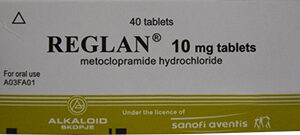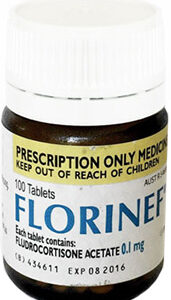Florinef Medication Overview
Florinef, the brand name for Fludrocortisone, is a synthetic adrenocortical steroid with potent mineralocorticoid properties and moderate glucocorticoid effects. It is primarily used to treat conditions such as Addison’s disease, adrenogenital syndrome, and salt-losing adrenogenital syndrome. It is also prescribed off-label for orthostatic hypotension.
Pharmacological Properties
Fludrocortisone acetate, the active ingredient in Florinef, exhibits high mineralocorticoid receptor affinity, thereby promoting sodium retention, potassium excretion, and increasing water retention. The glucocorticoid activity is approximately 15 times more than that of hydrocortisone.
Formulation and Strengths
Florinef is available in tablets for oral administration. Each tablet typically contains 0.1 mg of Fludrocortisone acetate. The tablets also contain lactose, maize starch, sucrose, and other excipients.
Dosing Guidelines
Initial dose for adults often starts at 0.1 mg per day, which may be adjusted on the basis of the patient’s response and electrolyte levels. Pediatric dosing requires careful consideration of the child’s weight and clinical response. Dosing adjustments should be made gradually to avoid adverse reactions.
Administration Instructions
Florinef tablets should be taken orally, ideally in the morning to replicate the body’s natural hormone cycle. They can be taken with or without food. Patients should follow their prescribed dosing schedule closely and not alter the dose without consulting a healthcare provider.
Indications for Use
Florinef is indicated for primary adrenocortical insufficiency, such as Addison’s disease, and for the treatment of salt-losing adrenogenital syndrome. Off-label, it may be used to treat orthostatic hypotension.
Monitoring Parameters
Regular monitoring of blood pressure, electrolyte levels (especially serum potassium and sodium), and signs of edema is important. Periodic assessment of weight and growth patterns in pediatric patients, and of adrenal function in all patients, should be conducted.
Adjustment in Special Populations
Dosage adjustments may be necessary for patients with renal impairment, liver disease, or in those who are experiencing significant changes in stress levels, such as surgery, infection, or trauma. Caution is advised in elderly patients who may have increased sensitivity or a different pharmacokinetic profile.
Potential Side Effects
Common side effects include hypertension, hypokalemia, edema, and heart enlargement. Less frequent side effects can be muscle weakness, osteoporosis, gastrointestinal disturbances, and dermatological reactions. Fludrocortisone can also exacerbate existing infections.
Drug Interactions
Fludrocortisone can interact with drugs like diuretics, digitalis glycosides, insulin or oral antidiabetics, nonsteroidal anti-inflammatory drugs (NSAIDs), and anticoagulants, potentially requiring dose adjustments of the interacting medications or additional monitoring.
Overdose Management
In the event of overdose, symptomatic treatment should be initiated. Overdose may lead to hypertension, hypokalemia, and significant fluid retention. Chronic overdose requires gradual tapering of the dose to avoid potential adrenal insufficiency.
Storage Conditions
Florinef should be stored at room temperature, away from light and moisture. It should not be stored in the bathroom and should be kept out of reach of children and pets.
Discontinuation of Therapy
Florinef therapy should not be discontinued abruptly. Gradual dose reduction is recommended to prevent adrenal insufficiency when stopping the medication. Patients should consult a healthcare provider for a tapering schedule if discontinuation of therapy is indicated.
Use During Pregnancy and Lactation
Fludrocortisone should be used during pregnancy only if the potential benefit justifies the potential risk to the fetus. The medication is excreted in breast milk, so caution should be exercised when administered to nursing mothers.
Effect on Laboratory Tests
Fludrocortisone can affect laboratory tests, including electrolytes, blood glucose, and adrenal function tests. It may also alter responses to skin tests and suppress reactions to allergy testing.
Handling Missed Doses
If a dose is missed, the patient should take it as soon as possible, unless it is almost time for the next dose. In such cases, the missed dose should be skipped, and the regular dosing schedule should be resumed. Double dosing is discouraged.
Counseling Points for Patients
Patients should be counseled on the importance of adhering to prescribed dosing and monitoring schedules. They should also be informed on the necessity of reporting any signs of electrolyte disturbances or any other new symptoms. Diet and lifestyle modifications, such as consuming potassium-rich foods or salt substitutes, should be discussed if relevant.
Specific Patient Advice
Patients with a history of tuberculosis or who are currently receiving immunization therapy should advise their physician, as fludrocortisone may have contraindications in these scenarios. Those participating in strenuous activity or who are exposed to extreme heat should take extra precautions to stay hydrated and monitor their electrolyte balance.







Reviews
There are no reviews yet.